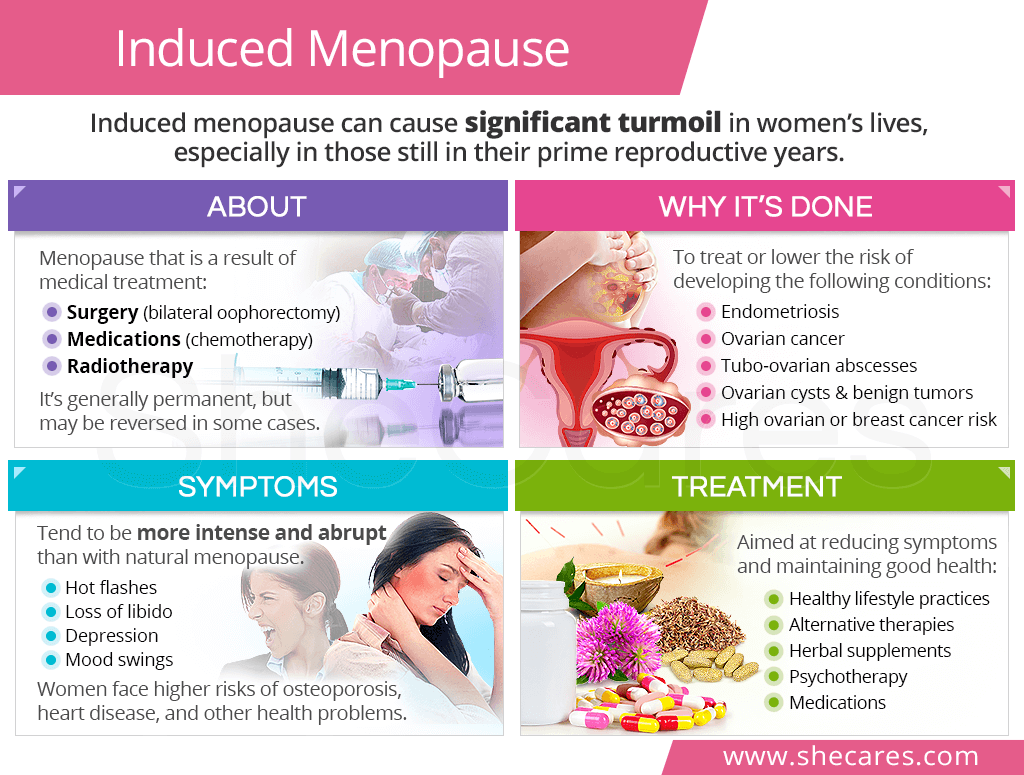What is Induced Menopause?
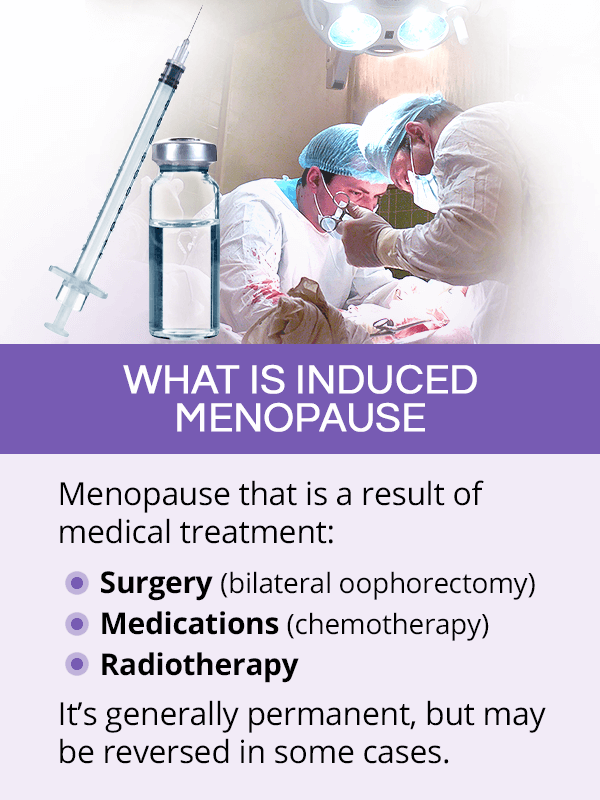
The term induced menopause is used when menopause happens as a result of medical treatment. It can be induced in women of various ages, including young women who are years away from reaching menopause naturally.
When it occurs between the ages of 40 and 45, it causes early menopause, whereas inducing it in women before the age of 40 leads to premature menopause.
Induced menopause means that a woman's fertility is hindered and - in most cases, which are discussed below - she cannot get pregnant naturally. Those planning to get pregnant can do so through in vitro fertilization (IVF) with their own frozen eggs or egg donation.
Types of Induced Menopause
There are three ways in which menopause may be induced, including the following:
Surgery. Removing both ovaries, called bilateral oophorectomy, will cause menopause right away. This type of induced menopause is permanent and referred to as surgical menopause.
Medications. Certain medications, including chemotherapy and some hormone therapy, might trigger medical menopause. Their effects can sometimes be reversed over time, especially in younger women.
Radiotherapy. Applying radiotherapy to the pelvis might damage the ovaries and disrupt their functions, inducing menopause either temporarily or permanently.
Reasons for Induced Menopause
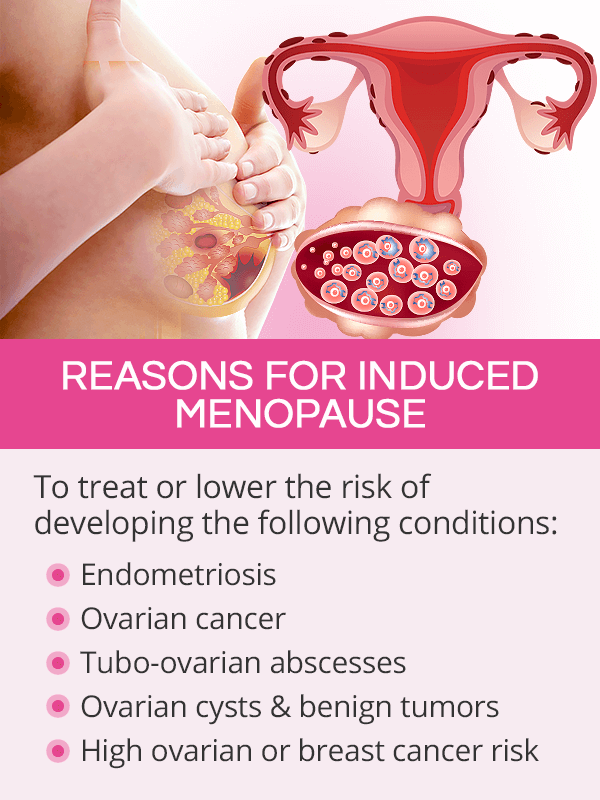
Women may undergo induced menopause for various health-related reasons. Usually, its main purpose is lowering the risk of developing serious conditions, treating them, or reducing potential complications on women's health.
The most common reasons for induced menopause in women of all ages are as follows:
- Endometriosis
- Tubo-ovarian abscesses
- Ovarian cancer
- Ovarian torsion
- Ovarian cysts or non-cancerous tumors
- High ovarian or breast cancer risk
Moreover, women struggling with premenstrual dysphoric disorder (PMDD) may undergo surgically-induced menopause as the last resort. PMDD is a severe form of premenstrual syndrome (PMS), causing extreme psychological and physical symptoms.
Induced Menopause Symptoms
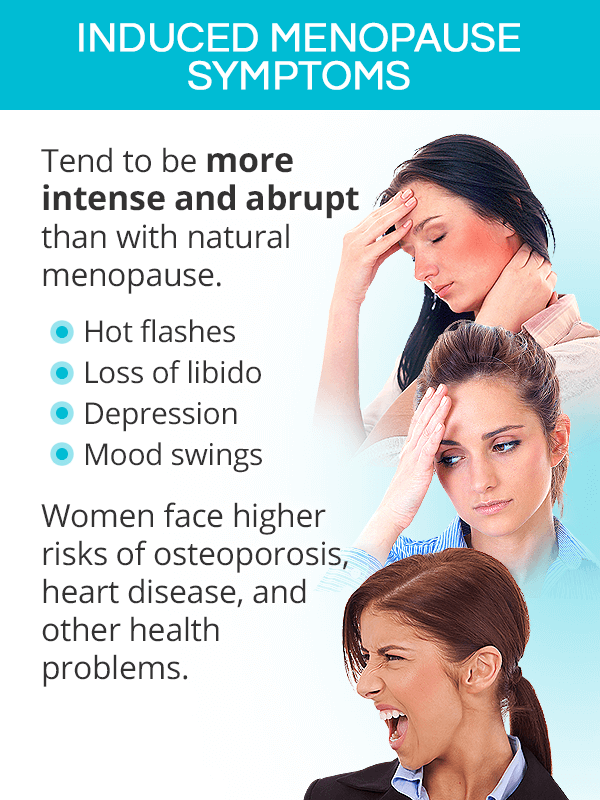
Women undergoing induced menopause will experience the same, but oftentimes more intense, symptoms than those going through it naturally.
The time of their onset might vary slightly, depending on how menopause was induced:
- In the case of surgical menopause, symptoms appear right after it has been performed.
- With menopause due to medications or radiotherapy, their onset may take a few weeks or months.
The most commonly experienced menopause symptoms include, but are not limited, to the following:
Additionally, due to low hormone levels following menopause, women are at an increased risk of certain menopause problems, including osteoporosis or menopausal heart disease.
Induced Menopause Treatment
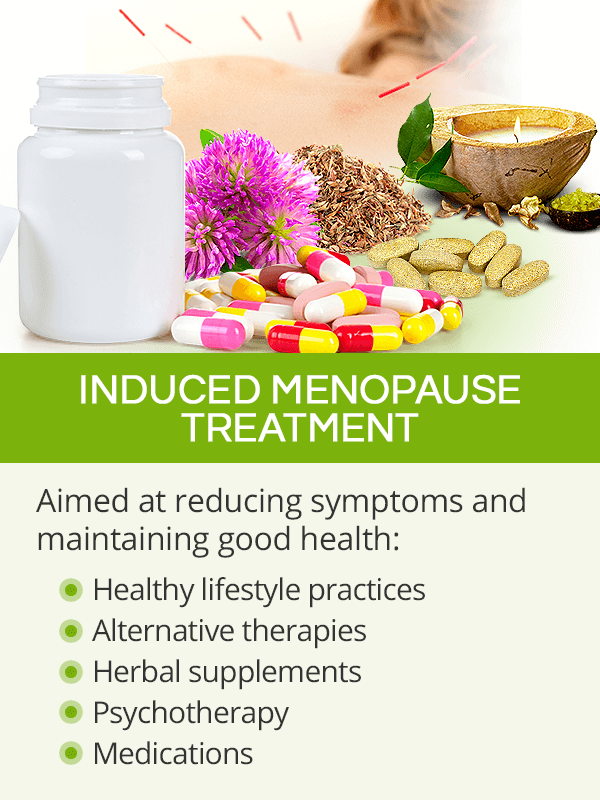
The choice of treatment for induced menopause symptoms will depend on several factors, including their type and severity as well as a woman's age and health risks she may face.
Generally, menopausal women are strongly encouraged to put their focus on relieving their symptoms naturally and considering pharmacological treatments only if necessary.
Natural Induced Menopause Treatments
There are three main approaches to treating menopause symptoms naturally: optimizing one's lifestyle habits, considering alternative therapies, and taking herbal supplements.
- Daily practices. Enriching diet with calcium and vitamin D, cutting out unhealthy habits, exercising regularly, and taking care of one's mental health are the basis of staying in optimal health after induced menopause.
- Alternative therapies. There is a rich variety of natural therapies that have been shown to relieve both physical and psychological menopause symptoms, including acupuncture, aromatherapy, and massage.1,2,3
- Herbal supplements. Herbal supplements for menopause include phytoestrogenic supplements, like red clover, and hormone-regulating supplements, like Macafem, which effectively ease pesky symptoms.
Pharmacological Induced Menopause Treatments
Medications for menopause symptoms will typically be carefully tailored to a woman's symptoms, age, health status, and other key factors to ensure that their risks do not outweigh benefits.
- Hormone replacement therapy (HRT) can relieve menopause symptoms, but should be used cautiously because of the associated side effects.4 Bear in mind that women who undergo induced menopause at a younger age may be prescribed HRT short-term to lower certain risks of low hormone levels.
- Other medications may also be considered to alleviate specific symptoms, including antidepressants, antihistamines, and osteoporosis medications, among others.
Additionally, undergoing psychotherapy after induced menopause can bring relief from not only psychological symptoms, but also physical symptoms, such as hot flashes and night sweats.
Key Takeaways
The term induced menopause is used when it happens as a result of medical treatment, including surgery, medications, or radiotherapy. In the majority of the cases, it is permanent, which means that a woman's fertility is halted, no matter her age. In some instances, however, menopause induced by medications or radiation therapy can be reversed. Women generally undergo induced menopause for medical reasons, such as endometriosis or ovarian cancer, among others. Most experience abrupt and intense symptoms and - because of low hormone levels - face increased risks of osteoporosis and heart disease. Treating induced menopause symptoms and maintaining optimal health can be achieved with a healthy lifestyle, herbal supplements, and pharmacology.
Sources
- International Association for Premenstrual Disorders. (2017). Treatment Options. Retrieved March 8, 2021 from https://iapmd.org/treatment-options
- Maturitas. (2011). Premature menopause or early menopause: long-term health consequences. Retrieved March 8, 2021 from https://www.ncbi.nlm.nih.gov/pmc/articles/PMC2815011/
- Medicine. (2019). Surgically Induced Menopause - A Practical Review of Literature. Retrieved March 8, 2021 from https://www.ncbi.nlm.nih.gov/pmc/articles/PMC6722518/
- Menopause. (2014). Oophorectomy: the debate between ovarian conservation and elective oophorectomy. Retrieved March 8, 2021 from https://www.ncbi.nlm.nih.gov/pmc/articles/PMC3514564/
- Office on Women's Health. (2019). Menopause. Retrieved March 8, 2021 from https://www.womenshealth.gov/menopause
Footnotes:
- North American Menopause Society. (n.d.). Instant Help for Induced Menopause. Retrieved March 8, 2021 from https://www.menopause.org/for-women/menopauseflashes/menopause-symptoms-and-treatments/instant-help-for-induced-menopause
- Menopause (2017). Acupuncture in Menopause (AIM) Study: A Pragmatic, Randomized Controlled Trial. Retrieved February 16, 2021 from https://www.ncbi.nlm.nih.gov/pmc/articles/PMC4874921/
- Menopause. (2012). Effect of aromatherapy massage on menopausal symptoms: a randomized placebo-controlled clinical trial. Retrieved February 16, 2021 from https://sci.bban.top/pdf/10.1097/gme.0b013e318248ea16.pdf#page=1&zoom=auto,-18,810
- Complementary Therapies in Medicine. (2020). The beneficial effects of therapeutic craniofacial massage on quality of life, mental health, and menopausal symptoms and body image: A randomized controlled clinical trial. Retrieved February 16, 2021 from https://www.sciencedirect.com/science/article/abs/pii/S0965229920304982
